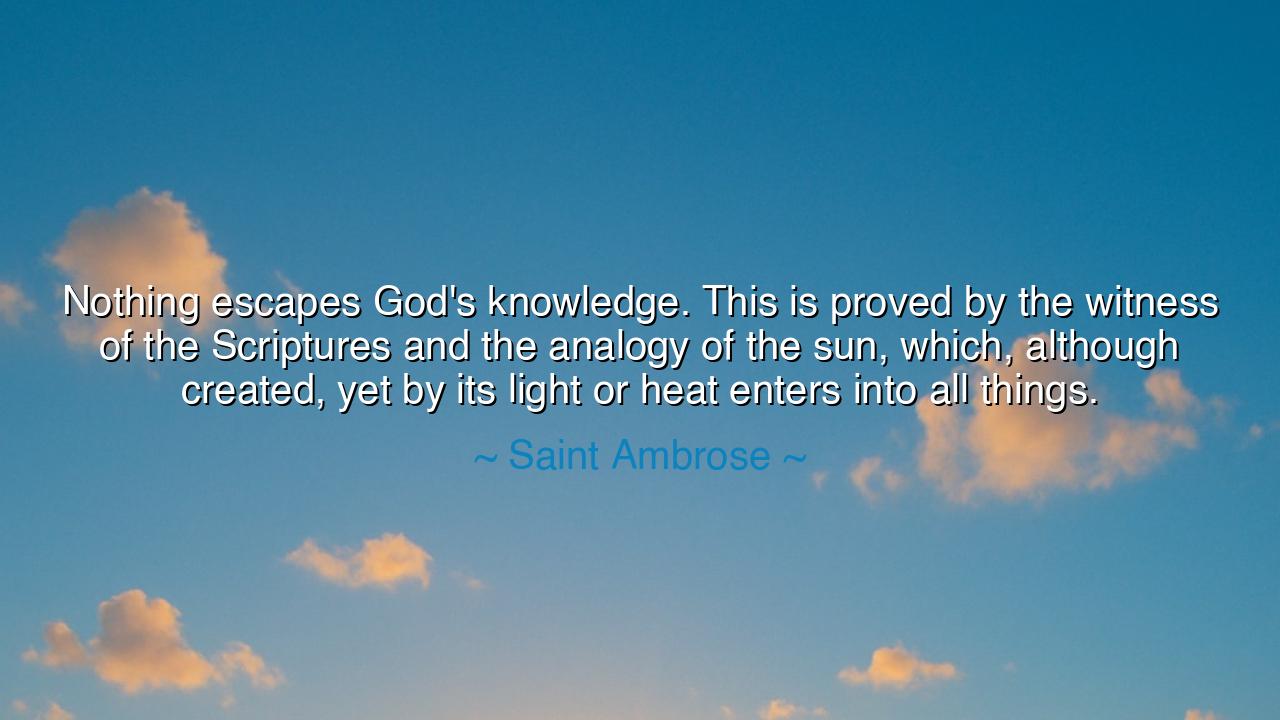
Nothing escapes God's knowledge. This is proved by the witness of
Nothing escapes God's knowledge. This is proved by the witness of the Scriptures and the analogy of the sun, which, although created, yet by its light or heat enters into all things.






Hear, O seeker of truth, the sacred wisdom of Saint Ambrose, the great Bishop of Milan, whose words shine like a torch across the centuries: “Nothing escapes God’s knowledge. This is proved by the witness of the Scriptures and the analogy of the sun, which, although created, yet by its light or heat enters into all things.” In these few lines, Ambrose unfolds a mystery that has consoled saints, humbled kings, and awakened the conscience of humankind — the all-embracing omniscience of God, whose knowing penetrates the universe as sunlight fills the dawn.
The meaning of this quote is vast and luminous. Ambrose speaks of the divine knowledge that sees all — not merely the deeds of men, but the thoughts, the motives, the hidden tremors of the heart. To him, God’s awareness is not cold surveillance, but radiant presence — as the sun, though distant, touches all things with its warmth and light. So too does God’s knowledge enter the hidden corners of creation, not to scorch, but to illumine. Nothing is lost to Him: not the cry of a child, nor the sigh of the weary, nor the whisper of the sinner who longs for redemption. The divine eye does not judge as man judges; it understands and encompasses all.
The origin of Ambrose’s words lies in his meditation on the Book of Psalms and the Book of Wisdom, where it is written: “The eyes of the Lord are in every place, beholding the evil and the good.” In the early Church, Ambrose sought to make this truth known not through terror, but through wonder. He lived in an age when emperors trembled before worldly power, yet he reminded them that no human crown stands beyond the gaze of Heaven. In his Exposition on the Psalms, he drew this analogy of the sun — a created thing that, though limited, still fills the world. If even the sun, a creature, touches all, how much more does the Creator permeate His creation with knowledge, care, and divine order?
To understand this wisdom, consider the example of Augustine of Hippo, Ambrose’s own disciple. Before he found faith, Augustine lived in doubt and pride, believing that truth could be contained by human reason alone. But when he heard Ambrose preach, he felt the warmth of a new light — a light that saw him not as he appeared, but as he truly was. Years later, Augustine wrote, “Thou wast within me, but I was outside of myself.” In that confession lies the living echo of Ambrose’s teaching: that God’s knowledge is not distant or abstract, but intimate, dwelling within the soul, like sunlight shining through glass.
The analogy of the sun is powerful not only for its beauty but for its truth. The sun does not ask permission to shine; it enters through every open window, pierces clouds, touches mountain and sea alike. So too God’s knowledge flows into all things, entering both the palace and the prison, the temple and the marketplace. The proud may try to hide beneath shadows of deceit, yet even there His light reveals the truth. The humble, meanwhile, rejoice in that same light, for to them it is not exposure but comfort. Thus, what one man fears as judgment, another welcomes as mercy.
This teaching also carries a moral fire. If nothing escapes God’s knowledge, then no act of goodness is ever wasted, and no secret evil goes unseen. The world may forget, but Heaven remembers. The kindness done in silence, the sacrifice unseen by men, the quiet endurance of the righteous — all are gathered in His knowing. Therefore, Ambrose’s words are both warning and consolation: live with integrity, for all deeds lie open before divine sight; and take courage, for your striving is never hidden from the eyes of eternity.
In this truth lies a lesson for the soul: walk as if bathed in sunlight. Do not fear the gaze of God, for it is the gaze of the One who formed you. Let His knowledge purify your intentions and strengthen your heart. Seek not to hide your weaknesses but to transform them, knowing they are already known. As the sun gives life to the earth, so does divine awareness give meaning to existence — for to be known by God is not to be exposed, but to be loved into truth.
Thus, remember always the words of Saint Ambrose: God’s knowledge fills all things as light fills the world. Live in that light — in honesty, humility, and courage. For though the sun may set and the stars may fade, the radiance of divine understanding never wanes. And in that eternal light, every soul that walks in truth shall find both judgment and mercy, perfectly joined in the infinite wisdom of the One who sees all, and loves all still.






AAdministratorAdministrator
Welcome, honored guests. Please leave a comment, we will respond soon